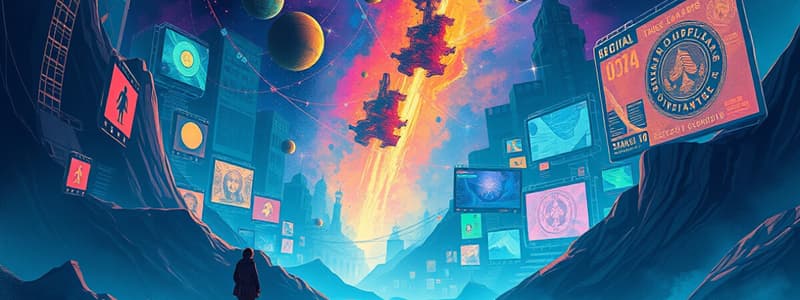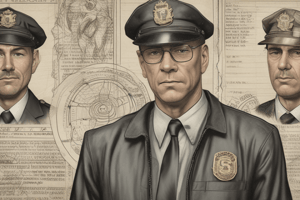Podcast
Questions and Answers
What is the primary challenge in defining digital media?
What is the primary challenge in defining digital media?
- It is defined only by its users.
- It only includes social media platforms.
- It has a clear historical timeline.
- It is rapidly evolving alongside technology. (correct)
Which of the following is NOT considered a type of digital media?
Which of the following is NOT considered a type of digital media?
- Streaming services
- Newspapers (correct)
- Social media platforms
- Video games
What characterizes digital media compared to traditional media?
What characterizes digital media compared to traditional media?
- It is transmitted as digital data. (correct)
- It is created and consumed in physical formats.
- It only includes text-based content.
- It is transmitted using analog signals.
What role do emerging digital media forms play in society today?
What role do emerging digital media forms play in society today?
What is the defining characteristic of a digital computer?
What is the defining characteristic of a digital computer?
Which of the following was a major influence in the transition to digital media?
Which of the following was a major influence in the transition to digital media?
What aspect of Moore's Law is primarily observed in computing technology?
What aspect of Moore's Law is primarily observed in computing technology?
Which invention is Charles Babbage most recognized for in the context of computing?
Which invention is Charles Babbage most recognized for in the context of computing?
Which of the following best represents an early form of digital computing?
Which of the following best represents an early form of digital computing?
What type of advancements are pivotal in understanding the evolution of digital media?
What type of advancements are pivotal in understanding the evolution of digital media?
Flashcards are hidden until you start studying
Study Notes
Definition of Media
- Media originates from the Latin word medius, meaning “the middle layer.”
- It encompasses various forms including mass media, news media, traditional media, and digital media.
Traditional vs. Digital Media
- Traditional media includes analog forms such as radio, newspapers, magazines, and billboards.
- Digital media is transmitted as digital data, using binary signals (0s and 1s) to deliver audio, video, graphics, and text.
- The digital age began in the late 20th century, driven by advancements in computer technology and internet accessibility.
Characteristics of Digital Media
- Digital media includes videos, articles, advertisements, podcasts, audiobooks, virtual reality, and digital art.
- The rise of the internet shifted media consumption habits by integrating digital technology into daily life.
Evolution of Digital Media
- Analog technology dominated until the late 1990s, but the advent of the internet catalyzed widespread digital media use.
- Current trends show increased use of digital devices, such as smartphones, that facilitate communication and entertainment.
Types of Digital Media
- Digital media can be categorized into subgroups, influencing multiple industries and enabling diverse career paths.
- Innovations within digital media have revolutionized fields like medicine, allowing for advanced simulation and training in surgery.
Major Digital Media Companies
- The digital landscape is dominated by tech giants, many of which maintain diverse interests within digital media.
- These companies contribute to various innovations and developments in media technology.
Digital Media Career Opportunities
- Job roles in digital media include graphic designers, web developers, and digital media specialists, each requiring specific skill sets.
- Graphic designers create visual content and had a workforce of around 290,100 in the U.S. as of 2018, with a median salary of $50,370.
- Web developers, with about 160,500 employed in the U.S., have a median annual income of $69,430 and are projected to grow by 13% by 2028.
- Digital media specialists are versatile professionals with skills in social media content creation and digital marketing, averaging a salary of $34,000.
Importance of Internships in Digital Media
- Internships provide practical experience and networking opportunities for aspiring digital media professionals.
- Skills valuable for internships include writing, photography, graphic design, and social media capabilities.
- Some internships may be unpaid, so students should weigh the experience gained against potential compensation.
Future of Digital Media
- Digital media is expected to become even more integrated into everyday life with developments in AI and augmented reality.
- Careers in digital media benefit from relevant educational programs, such as those offered by Maryville University, that focus on design and marketing in the digital space.
Evolution of Digital Media Technology
- Digital media technology has experienced rapid evolution, becoming integral to everyday life.
- Charles Babbage envisioned machine-readable codes in the early 1800s; his Difference Engine was designed for mathematical calculations.
- The Analytical Engine, his most notable invention, utilized punched cards for instructions and had a memory unit, laying groundwork for modern computers.
Early Computers
- Analogue computers operated using continuous quantities, while digital computers emerged in the late 1930s to early 1940s, processing data in numerical digit form.
- The term "digital" was first applied to computers in 1938, indicating machines utilizing discrete data elements.
Moore's Law
- Moore's Law, formulated around 1970, posits that processor speeds and computing power will double approximately every two years.
- This principle has driven technological advancements, enhancing digital media capabilities like live streaming and increasing global computing accessibility.
Influence of Television
- The introduction of cable television (CATV) allowed broader access to broadcast TV, laying the foundation for Digital TV.
- Digital TV adoption began in the late 1990s, with a global transition from analog to digital expected to complete by the mid-2010s.
- Sky News launched in 1989 as a 24-hour news channel, illustrating the shift from traditional newspaper readership to digital media consumption.
Emergence of the Internet
- Tim Berners-Lee invented the World Wide Web in 1989; internet access has since become essential, with users reaching 3 billion by 2015.
- YouTube, launched in 2005, serves over 1 billion active users monthly, facilitating video sharing; 100 hours of video are uploaded every minute.
- WikiLeaks, known for publishing classified information, has influenced media coverage and public awareness on critical issues.
- Netflix allows streaming of unlimited films and shows for a monthly fee, altering how people consume entertainment.
Music Industry Innovations
- The music industry has shifted dramatically away from physical formats like vinyl, tapes, and CDs.
- In 1948, Columbia Records introduced the long-playing record, while the compact disc (CD) was commercially released in 1982.
- The MP3 format revolutionized music consumption, enabling portable storage of thousands of songs; Apple's iPod launched in 2001 played a significant role in this transition.
- Streaming platforms like Spotify (launched in 2008) and others have become mainstream, reflecting changing preferences in music consumption.
Conclusion
- Digital media significantly shapes modern life and continues to evolve.
- Future blog posts are expected to explore current trends and anticipate developments in digital media technology.
Studying That Suits You
Use AI to generate personalized quizzes and flashcards to suit your learning preferences.




